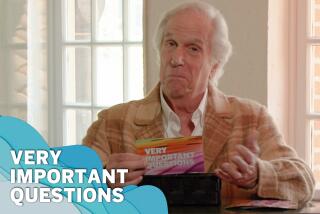Books Explore Schwarzenegger’s Psyche, Strategies
After “Last Action Hero” opened a dozen years ago, Arnold Schwarzenegger found a negative review from USA Today on his desk and, in Schwarzenegger’s words, “went ballistic.”
He hated bad news in the morning.
“When you’re successful, people take a certain joy looking you in the eye and giving you a bad review. I don’t need that. I need always positive reinforcement and then face reality,” Schwarzenegger is quoted in Laurence Leamer’s new book, “Fantastic: The Life of Arnold Schwarzenegger.”
The failure of “Last Action Hero” is a nice counterpoint to anyone who thinks Schwarzenegger’s slumping popularity as governor is unprecedented.
Politics can be just as ruthless and unforgiving as Hollywood, but Schwarzenegger has managed to brush aside his numerous failures and personal embarrassments and declared success.
Two recent books about Schwarzenegger attempt to show how he does it: through an obsession with forward movement, exaggerations and public manipulations, by belittling his enemies, and with good humor about himself that lately has gone lacking.
“He’s a man who his whole life has had this joyful quality to him,” Leamer said in an interview. “Now it’s beginning to look like Lyndon Johnson in the White House. The protesters are out there in big numbers.... He is alone. Only Arnold can get himself out of this now.”
Although the 432-page “Fantastic” is not an authorized biography, Leamer interviewed the governor and the major figures in his life to paint a birth-to-now portrait. Leamer is the author of “The Kennedy Women” and “The Kennedy Men,” as well as biographies of Ingrid Bergman, Ronald and Nancy Reagan and Johnny Carson.
One of the most telling stories about Schwarzenegger involves his relationship with the flamboyant Cuban American bodybuilder Sergio Oliva.
Leamer writes that Schwarzenegger praised Oliva in public “to quell his competitive fires and to quiet Oliva’s vociferous fans,” while he studied films of Oliva posing so he “could choreograph his own moves to show him up.”
Then, at the Mr. Olympia contest in 1970, Schwarzenegger struck back in certainly one of the most thrilling finishes to any major bodybuilding contest.
The story is key to Schwarzenegger’s unique ability as a psych-out artist.
In what Leamer describes as an “animalistic ritual from thousands of years ago, two naked beasts in a clearing, strutting and spouting,” Schwarzenegger and Oliva drove the crowd wild with their posing during the final stage of the event.
The crowd -- full of Oliva partisans and a sizable contingent of Schwarzenegger admirers -- saw no clear winner. But Schwarzenegger believed he had won.
Schwarzenegger turned to Oliva on stage and asked if they should leave together, with Oliva departing first. Oliva agreed and left the stage, but Schwarzenegger stayed behind for more poses, despite their informal agreement to finish.
The crowd went wild, screaming for Schwarzenegger, believing Oliva had given up. “Few judges would have dared deny the crowd its verdict,” Leamer writes. Schwarzenegger captured his first Mr. Olympia contest.
“With his bodybuilding opponents, he not only had to beat them, he had to destroy them,” Leamer said.
The same could be true of Schwarzenegger’s relationship with actor Sylvester Stallone. Schwarzenegger gave a damaging interview to Playboy magazine in 1988 in which he ridiculed Stallone for wearing fur coats and white suits and said “there is nothing anyone can do out there to save ... his image.”
Schwarzenegger claimed the words were said off the record, but the damage was done.
“With Stallone, it was nothing more than Stallone was the biggest star in the world, and he was a star in the arena Arnold wanted to be in,” Leamer said. “Arnold did something no one else would do. He started making fun of him.”
Now, as the governor faces declining poll numbers and an apparent loss of voters’ confidence, Leamer said Schwarzenegger’s unique abilities to manipulate his opponents and create controversy to propel his ambition appear to be backfiring.
The public is no longer responding to the “girlie man” insults about the state Legislature or politics as usual in Sacramento. Leamer thinks Schwarzenegger miscalculated by picking the wrong enemies: not public figures such as Stallone or Oliva, but nurses, teachers and firefighters.
“The characteristics that have worked his whole life are not working anymore,” Leamer said.
Gary Indiana’s “Schwarzenegger Syndrome: Politics and Celebrity in the Age of Contempt” is useful for anyone interested in how the governor easily surfs culture to achieve his will to power.
Indiana is the author of a well-received novel about Los Angeles, “Resentment,” and divides his time between Southern California and Manhattan.
Certainly the most intellectual of any books about the governor, “Schwarzenegger Syndrome” is not a biography but rather an extended essay that grew out of Indiana’s work on the 2003 recall election for the London Review of Books.
Indiana said in an interview that Schwarzenegger’s speech at the 2004 Republican National Convention persuaded him to write the 140-page polemic.
He described Schwarzenegger’s speech as “propaganda in the service of narcissism.”
“It was the first time I had seen a politician mobilize real authentic energy from any group of people for so long in this country,” Indiana said. “They were cheering for their favorite movie star and all kinds of cliches he represented, and because he could deliver them in a way that sounded fresh.”
In the book, Indiana sees a culture of “victimhood and recuperation ... where a sense of community is generated exclusively by disasters and scandals.”
Schwarzenegger, however, turned his negatives (notably, his treatment of women, detailed in the Los Angeles Times and other publications) into “positive narratives of redemption favored by Christian fundamentalists.”
“He is a very Nietzschean figure, there is no question about it,” Indiana said. “The obduracy is something you have to be in awe of. This is somebody who will just beat the wall until the wall breaks.”
*
(BEGIN TEXT OF INFOBOX)
Book Excerpts
* Arnold’s triumph was only a skirmish before the Mr. Olympia contest, and Arnold used the occasion to plant what he hoped would be the seeds of [Sergio] Oliva’s defeat in New York. He gently suggested to Oliva that to be at his prime, he needed to gain some weight before their next meeting....
“I told you you lost in Ohio because you were too light, and you were foolish enough to believe me [Schwarzenegger told Oliva]. Do you really believe I would tell you how to beat me?”
Arnold was saying that he was so persuasive, so cunning, that no matter how many times he misled his opponents, they still believed him and followed his dubious strategy to their doom.
-- Laurence Leamer, “Fantastic: The Life of Arnold Schwarzenegger” (St. Martin’s Press)
*
* On Leno, Oprah and other unchallenging entertainment programs where obsequiousness constitutes a job description, Arnold’s appearances accomplished an almost subliminally imprinted conflation of the civic sphere and celebrity worship.... By his artful use of these venues, Schwarzenegger cultivated the impression that he was condescending to run for governor of California, an impression that carried an implication of sacrifice, which in turn could only be accounted for by a powerful wish to serve the public.
-- Gary Indiana, “Schwarzenegger Syndrome: Politics and Celebrity in the Age of Contempt” (The New Press)
*
Los Angeles Times
More to Read
Sign up for our Book Club newsletter
Get the latest news, events and more from the Los Angeles Times Book Club, and help us get L.A. reading and talking.
You may occasionally receive promotional content from the Los Angeles Times.






